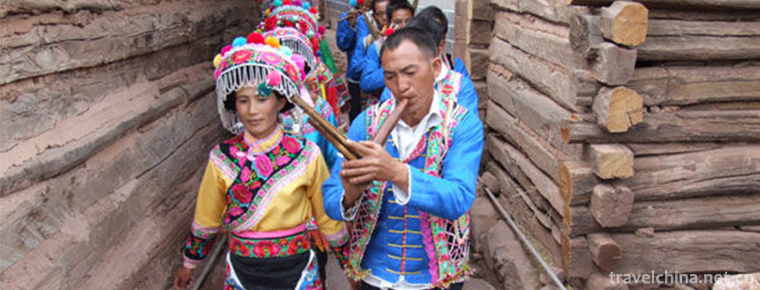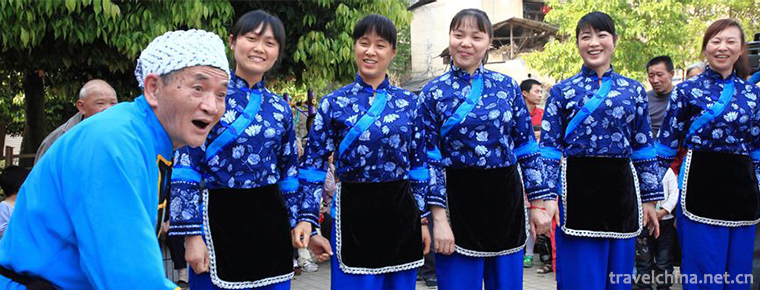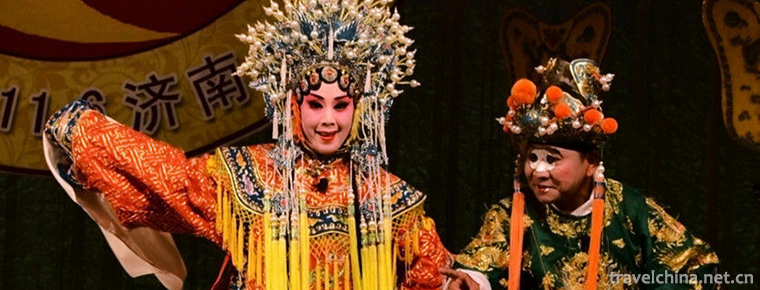2019-06-02

- By ChinaWiki.net
- Chinese Edition
- 2020-11-08
Tianshi cave
Tianshi cave, also known as Chang Taoist temple, is the most important Taoist temple in Qingcheng Mountain. In 1983, it was designated as the national key Taoist temple by the State Council. In addition, there are four palaces in Qingcheng Mountain: Jianfu palace, Yuanming palace, Yuqing palace and Shangqing palace.
It is said that at the end of the Eastern Han Dynasty, Zhang Daoling, the founder of Tianshi Taoism, practiced preaching among the cliffs of the third Hunyuan peak on Qingcheng Mountain in Guanxian County, Sichuan Province, commonly known as Tianshi cave. The original temple was destroyed early and rebuilt in Qing Dynasty. There are three kinds of halls, namely Sanqing hall, Sanhuang hall and Huangdi temple.
Main attractions
Sanqing Hall
Sanqing hall is the main hall, built in 1923, is a double eaves Xieshan Pavilion style building. In front of the hall, there are 9 stone steps, 6 large stone columns arranged on the front eaves, and 5 rooms in the hall. In the middle of the hall, there is a plaque on the imperial script of Emperor Kangxi of the Qing Dynasty: "Dan Tai Bi Dong". There are several couplets hanging in front of the hall, one of which reads: "one's life is two, two is three, and three is all things; earth follows heaven, heaven follows Tao, and Tao follows nature.". This couplet is not only the true transmission of Laozi's Taoist thought, but also implies the profound implication of "one Qi turns into three Qing". The three supreme deities worshipped in Sanqing hall are the Yuanshi Tianzun in Yuqing fairyland, Lingbao Tianzun in Shangqing fairyland and moral Tianzun in Taiqing fairyland. Taoism believes that these three gods are the creators of all things in the world.
Sanhuang Hall
The other main hall of Tianshi cave is the Sanhuang hall. There are 1 stone statues of Fuxi, Shennong and Huangdi, about 1 meter high. They were carved in the 11th year of Kaiyuan of Tang Dynasty (723 AD), all of which were seated statues. Taoism takes Huangdi and Laozi as their ancestors. It is said that the Yellow Emperor learned Taoism from the immortal Ning Fengzi in Qingcheng Mountain. Ning Fengzi also helped him defeat Chiyou. Later, the Yellow Emperor achieved great achievements and became an immortal by riding the dragon. Ning Fengzi was named the main immortal of Qingcheng Mountain. Therefore, in Qingcheng Mountain, not only the three emperor temple was dedicated to the Yellow Emperor, but also a yellow emperor temple was built for him.
Huangdi Temple
The ancestral hall of the Yellow Emperor was built in Sui Dynasty, and it was one of the earliest temples of Tianshi cave. Therefore, it was once called Tianshi cave in Song Dynasty. On the forehead of the main gate, there are four big words of "ancient Yellow Emperor Temple" written by Mr. Youren.
There is a hole on the left side of Huangdi temple. It is said that it is the place where Zhang Daoling practiced. This is what people call Tianshi cave. At the top of the cave, there is a niche, which enshrines the statue of Tianshi Zhang carved in the Sui Dynasty. His face has three eyes and his manner is dignified. The left hand palm extends straight out, and holds the treasure of Tianshi Zhenshan: "the seal of Yangping governing the capital". Outside the cave, there are also statues of Zhang Daoling's 30 generations grandson and Zhang Jixian, the emperor of Xujing in Song Dynasty.
Historical legend
The scenery near Tianshi cave is beautiful. There are three island stones in the East. There are two cracks on the huge stone, so it is named. According to folklore, when Tianshi Zhang was subduing demons, he saw the stone blocking the road, so he took out his sword and split it into three pieces. The stone was engraved with the word "subdue the devil". The spring water circulates around the stone and covers the sky with thick shade. Along the stone steps cut by the stone gap, you can go down to the side of Haitang river. The stream is deep, the wall is steep, and the vines are hanging down. It is very quiet. There is a legend that there are more than sixty meters deep in the cave when the master throws a magic pen.
Traffic information
Take bus No.101 and 102 to Dujiangyan, and walk to the scenic spot.
Ask a Question
Your email address will not be published.



0 Questions